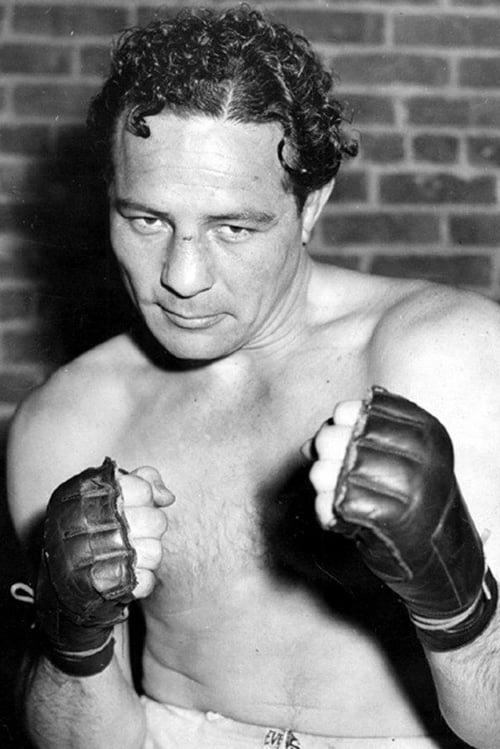Max Baer is arguably best known today for siring Max Baer Jr., the actor who played Jethro Bodine on the classic TV series The Beverly Hillbillies (1962). However, old-timers, followers of the sweet science, and viewers of the film Cinderella Man (2005) all know that Max Sr. was boxing's heavyweight champion of the world for all of 364 days, from the time he knocked out Primo Carnera on June 14, 1934, to the day he lost his title to Jimmy Braddock on June 13, 1935. Cinephiles also will remember the colorful Max from his numerous bit roles in films, including Bud Abbott and Lou Costello's Africa Screams (1949) to his near-autobiographical turn in the Budd Schulberg boxing expose The Harder They Fall (1956) starring Humphrey Bogart. Ironically, it was his acting in the latter film that likely led to his misrepresentation in "Cinderella Man" as being something akin to a monster, when actually, according to his family and those who knew him, he was an amiable man. Some fight fans thought that it was his good nature, which they attributed to his clowning, that eventually did him in, as he would not bear down on his opponents in the latter part of his career. Max Jr. says that his father wanted to be an actor, an insight that explains the flashy persona he displayed in and outside the ring as he wisecracked and clowned his way through careers as a boxer and performer in movies and nightclubs. Blessed with what "The Boxing Register: International Boxing Hall of Fame Official Record Book" terms the most powerful right hand in heavyweight history, Baer used that right to gain a fearsome reputation as a California prizefighter before moving to New York and taking on the top ranks of the heavyweight division.
Life-loving, people-centric thrill seekers, the ESFP personality type is interested in people and experiences throwing themselves into relationships and life in general, they have a genuine interest in others and their dislike of rules and routine, are justified by their view that their reason for existing is to bring harmony, sympathy and support to peoples' lives so they may slide out of regulations or obligations on the grounds that: 'I just had to do something to help.' The keywords here are 'do' and 'help;' caring and practical in equal measure. The ESFP has an ability to make others feel so special. Down to earth and practical, ESFPs live in the here and now preferring to take life as it comes with the optimistic view that it’s bound to be good, (and if it isn’t then there’s always next time!).
If there is a crisis, the ESFP will be there, taking charge, offering support, revelling in their ability to help, loving the drama. Their energies and infectious enthusiasm, mean that other people will like them, and they will build relationships easily and often. The ability of the ESFP to drop everything and provide immediate, practical support may come at the expense of an ability to plan, schedule and prioritise. However, those on the receiving end will be grateful and left feeling really special. This may also cause a blurring between social time and work time, and the immediacy of the issue will, for the ESFP, be paramount and so it may be difficult to put an issue to 'one side' until a task is completed, or it is time to go home, etc.
The ESFP is not naturally good at follow-through, and will impulsively follow only their own urges, which tend to be the needs of others. Through meeting the needs of others, their own needs are also met; there is a paradoxical self-indulgence in indulging others. On the positive side the ESFP has an ability to make others feel so special, be excellent 'glue' for a team, and good at maintaining morale. As their decisions will be emotional and values-based, people will feel that they are valued and special and, whilst meetings may last longer than average, and little planning gets done, everyone leaves feeling part of something good and indeed feeling good.
The desire to make work a fun place may also cause difficulties in that an ESFP may not be able to take the hard decision - they prefer harmony and fun. This pragmatic desire to help, and do so immediately, means the ESFP will not respond well to being time-bound, or locked into a project. They live primarily in the moment and longer term for the ESFP might be Saturday, probably Friday. The ESFP likes concrete, material things and will take pride in their appearance and fill their lives with lots of experiences, jumping from one to the next in a breathless flurry. This can see them over-commit and take on too much, but their carefree nature means they will tend to charm their way through. As they want (indeed need) to experience everything, the ESFP may well have trouble prioritising as their focus is only for ‘now’ and so follow through won’t come naturally, and they’ll look to leave as many options open as possible, although the ‘F’ side means they will feel genuinely guilty when they let people down. The spontaneous, impulsive nature of this character is almost always entertaining and brings a smile to even the most serious of situations.
Primarily of the moment, extraverted and people-centric ESFPs do not like logic, analysis or abstraction or even thinking too deeply as it is difficult, time-consuming and energy sapping and it takes the focus away from the boundless things to be experienced - and it’s not very much fun. So let’s party!
Choose another celebrity type to compare side by side the different approaches work, attitudes to conflict and the way they engage with others.
